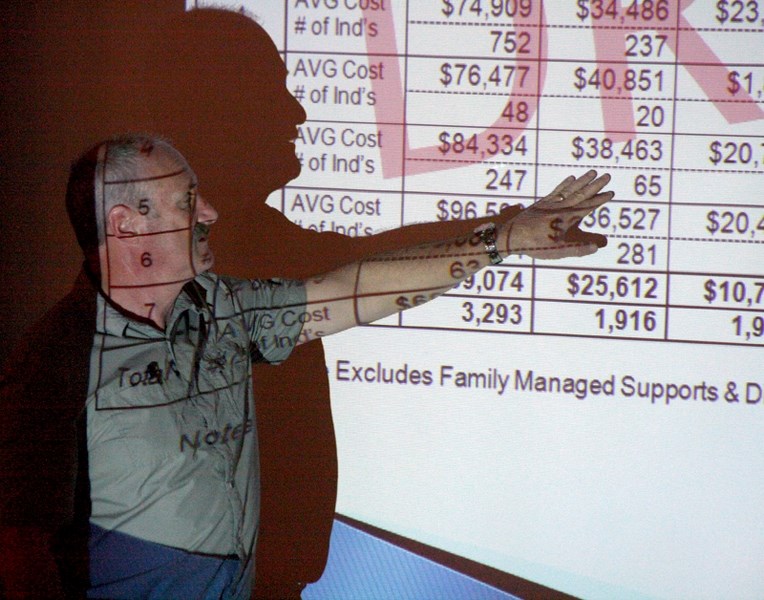The Westlock Independence Network held an information night for families to learn about the provincial funding cuts for people with developmental disabilities.
More than 40 people went to the Westlock Legion June 11 to learn more about the impacts clients could see on services, methods for coping with reduced funding and to review the new tool kit being implemented in roughly two weeks.
“I’m not trying to alarm people,” said Greg Morris, executive director of WIN. “These are things that might happen and we want to be prepared for the challenges.”
WJS Canada was invited to attend the public forum but elected not to participate, while representatives from Persons with Developmental Disabilities (PDD) were not invited.
The total northeast reduction target reduction is almost $9 million out of a $23 million budget. Some service providers have reported cuts as high as 50 per cent. In fact, WIN was told the worst-case scenario for their non-profit organization alone was $408,332.
“There are going to be cuts. I think it would be naive to believe that there are not going to be cuts, but we have to look at how we want to approach them.”
WIN staff member Annette Borle and WIN board chair Pierre Boisvert attended the meeting and Borle has been trained with the Support Intensity Scale (SIS) tool and explained her understanding about how it works. She said SIS doesn’t measure personal competence or current support levels — it evaluates what an individual needs.
“The SIS is meant to say that everybody should be able to do everything with the right amount of support,” said Borle. “It’s about measuring the support that people need to function in their day-to-day living.”
Part of the glitch that’s happened during the transition of services in Alberta, she said, is the SIS was only invented to be used as part of the equation for funding. In theory it’s a great tool for goal setting, Borle said.
“And as we get into this more, I think we’ll see that the SIS captures one part,” Borle explained. “And so people are getting lumped into a category that may not best describe what they actually need.”
There are only two weeks before funding grids for people with developmental disabilities are expected to expire and no new contracts are in sight. More than a week ago, Alberta Human Services Minister Dave Hancock indicated PDD service providers can extend their contracts. However, nobody appears to know how long contracts can be extended and if service providers will need to sign some sort of agreement to participate in the extension.
“The Minister of Human Services has not added any clarity since stepping into this boondoggle and continues to allow regional boards to confuse this situation,” Wildrose human services critic Jeff Wilson said in a recent press release. “The PDD boards are giving service providers, families and clients mixed messages depending on which region they are in. This minister needs to come clean.”
That fact concerns Morris.
“Part of the struggle is the lack of information,” he said. “We don’t know today what our funding is going to be this month.”
As a result, Morris brought in test scores for families that have completed the SIS evaluation and told people one-on-one meetings will be set up with clients to discuss the findings. But since he has not received a new funding grid, families will be hearing the worst case scenario.
“I asked again yesterday, and they don’t have a release date yet,” Morris explained. “We have been told verbally that there are going to be extensions until Sept. 1. We’ve tried to get some further explanations, but all we know is Sept. 1, so we don’t know that much or what the dollars are going to be like. This is the latest information we have and we know that the numbers are out of date. ”
Several people expressed concerns about the language being used in the SIS evaluation and a lack of information. In fact, one woman sat in during her son’s SIS evaluation and watched in horror as her son answered questions that were “obviously above his level of comprehension.”
She said PDD allowed him to answer evaluation questions over a three-hour interview without breaking down the information or using language he understood.
“We know people in this community are upset about this,” Morris replied. “And most of these people haven’t even had the same experiences as you.”
Other families suggested having another protest and writing letters to Barrhead-Morrinville-Westlock MLA Maureen Kubinec to express their concerns.
In addition is was noted that Frank Oberle, Alberta Associate Minister of Services for Persons with Disabilities, will be at the United Church in Barrhead on Tuesday, June 18.
It’s a meeting open to the public and will give people from the community an opportunity to ask questions about the funding cuts.
Afterwards, WIN is hosting a public forum to discuss information discovered after the meeting at 7 p.m. on June 20.



